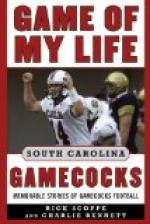But we learned that Major John Johnson, who has since become an Episcopal minister, in Charleston, S.C., wholly refused to agree with Capt. Mitchell in such a barbarous and cowardly act, and, as though Providence were watching over the innocent and oppressed negroes, and over the Yankees as well, because they were fighting in a righteous cause, Capt. Mitchell’s career and further chances of carrying out his cruel intentions were cut short. He was mortally wounded by the sharp-shooters of Fort Wagner, on the 14th of July, 1864, and died four hours afterwards.
OUR RATIONS IN SUMTER.
The working forces of negroes in Sumter with the exception of the boys who carried messages to the different parts of the fort day and night, were locked up days, and turned out nights, to work. We drew our rations of hard-tack and salt pork twice a day; mornings when we ceased work and turned in for the day, and again, between three and four o’clock in the afternoon, so as to have supper eaten in time to go to work at dark.
We often ate our salt pork raw with the hard-tack, as there were no special means of cooking in the negroes’ apartment. We were not only in danger, while at work, from the continued rain of shells, but oftentimes when we were put in line to draw our rations some of us were killed or wounded.
I cannot say how they got fresh water in Fort Sumter, as I do not remember seeing any brought there in boats, neither did I notice any conveniences there for the catching of rain water.
The water we negroes used was kept in large hogsheads with coal tar in them; I do not know what the tar was put in the water for unless it was for our health. The “rat-hole” into which we were locked, was like a sweat box; it was so hot and close, that, although we were exposed to death by shells when we were turned out to work, we were glad to get into the fresh air.
We had little cups in which they used to give us whiskey mornings when we went in, and again when we were going out to work at night.
I don’t know how many of the forty survivors of the three hundred and sixty of us who were carried into the Fort in the summer of 1864 besides myself are still alive. But if there are any with the keen tenderness of a negro, they cannot help joining me in an undying sense of gratitude to Major John Johnson, not only for his kind and gentle dealings with us which meant so much to a negro in the days of slavery, but also for his humane protection, which saved us from some of the danger from shells to which we were exposed in Sumter.
A short time after Capt. J.C. Mitchell had been killed, Major Johnson was dangerously wounded in the head by a piece of shell.




